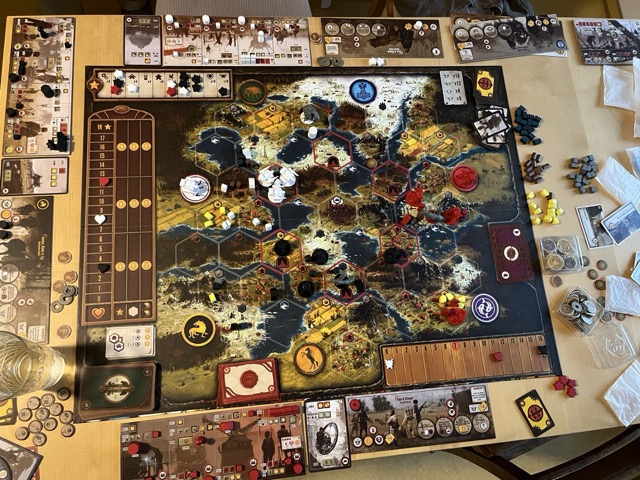Scythe
A friend of our son’s was over and brought a board game that the three of us tried: Scythe. The game is set in an alternate-1920s scenario where several empires are competing for territory and resources. It has a steampunk aspect in that large robotic devices (“mechs”) can be constructed and deployed.
Here’s how the board looks at the end of a game.

It’s instantly apparent that Scythe has a high degree of complexity. That’s to be expected: it’s a strategy game. Players have to balance different kinds of resources - money, materials, work, base and extended fighting power, and reputation - to achieve several goals. Ultimately, the player who first fulfils six goals ends the game, but without necessarily also winning it: the ensuing final evaluation takes multiple factors into account that contribute to each player’s score.
At first, each player controls a small amount of territory and has no mechs at their disposal. Four of those can be built - once the necessary resources are available. These can be obtained by establishing new settlements in territory that yields resources when the player does a production activity. Initially, players are also unable to cross water bodies (rivers and lakes). For that to be possible, a player needs to build a certain type of mech that enables wading through rivers or submerging in and crossing lakes. Players can also build tunnels, which enable them to move about the board more swiftly.
When one player’s mechs and/or leaders encounter another’s, a fight will ensue (of course). The fighting mechanics have an interesting twist in that the visible fighting power is amplified by (invisible) add-on fighting power. This makes for interesting surprises. The likelihood of such encounters increases very swiftly with the number of participating players.
One nice twist is that players cannot perform the same moves in two subsequent rounds, necessitating some careful planning ahead. This brings me to the conclusion: Scythe is a nicely strategic game with a high fun factor. The strategic aspect is way less hefty than in, say, Terra Mystica, which makes Scythe much more accessible than the former. The competitive aspect is strong in Scythe, but does not dominate: players don’t spend all the time fighting; the emphasis is more on balancing resources and one’s approach.
Warmly recommended.
Tags: games